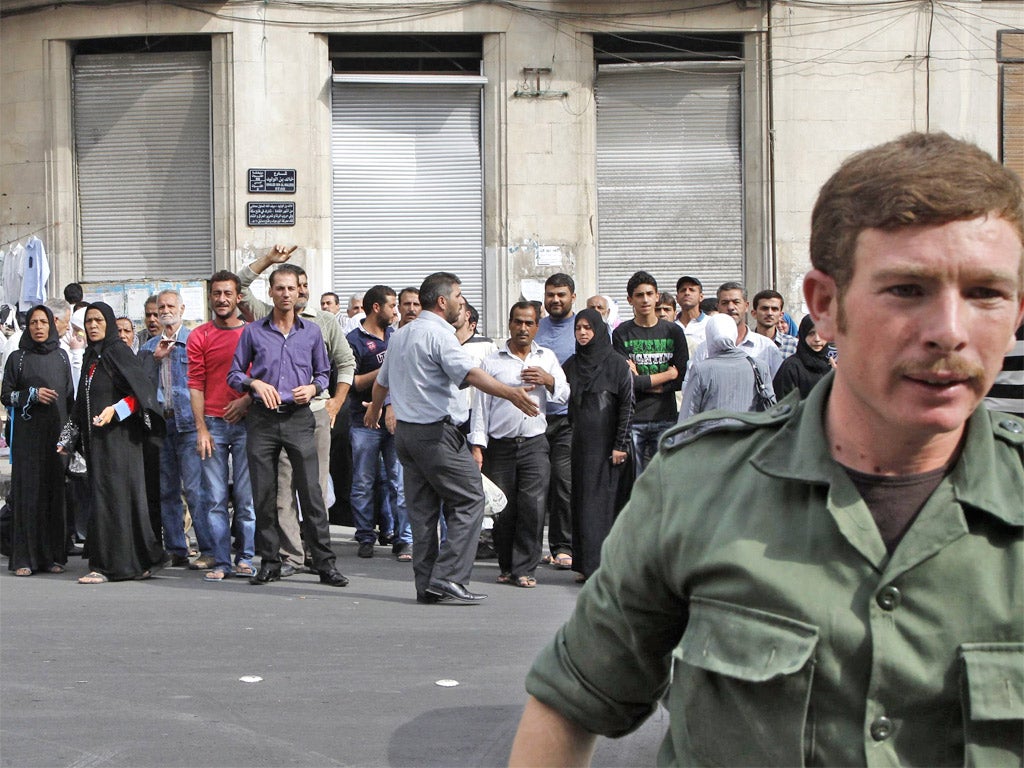Syrian regime 'agrees to ceasefire for Islamic holiday'

Your support helps us to tell the story
From reproductive rights to climate change to Big Tech, The Independent is on the ground when the story is developing. Whether it's investigating the financials of Elon Musk's pro-Trump PAC or producing our latest documentary, 'The A Word', which shines a light on the American women fighting for reproductive rights, we know how important it is to parse out the facts from the messaging.
At such a critical moment in US history, we need reporters on the ground. Your donation allows us to keep sending journalists to speak to both sides of the story.
The Independent is trusted by Americans across the entire political spectrum. And unlike many other quality news outlets, we choose not to lock Americans out of our reporting and analysis with paywalls. We believe quality journalism should be available to everyone, paid for by those who can afford it.
Your support makes all the difference.UN-Arab League peace envoy Lakhdar Brahimi's announcement that the Syrian regime has agreed to a ceasefire over the Muslim festival of Eid al-Adha was met with scepticism and confusion, as questions were raised over the truce's implementation and whether rebel factions would agree to it.
The picture was further clouded yesterday as the Syrian government said it was still in the process of "studying" the proposal, just hours after Mr Brahimi said that President Bashar al-Assad's regime had accepted to lay down arms over the Eid holiday, which begins tomorrow in Syria. Mr Brahimi said the government will release a statement accepting the ceasefire by the end of today.
In a reminder of the enormity of the task ahead, Syrian state television yesterday said a car bomb had exploded in southern Damascus, killing six people. In the country's north-west, rebels and regime forces remained locked in a fierce and strategically important battle, with fighter jets strafing positions near the town of Maarat al-Numan on a key supply line for regime troops in the city of Aleppo, which had fallen into rebel hands.
The stakes are high for the new envoy, who has been touring the region while attempting to broker a peace plan to bring an end to the 19-month conflict that is estimated by activists to have claimed more than 32,000 lives.
An April ceasefire secured by his predecessor, Kofi Annan, barely took hold. That truce was overseen by a team of UN peacekeepers, whereas there were no details of mechanisms to monitor or enforce the Eid ceasefire, the exact time frame of which remains unclear. When the envoy visited Lebanon last week, his spokesman, Ahmad Fawzi, told The Independent that the idea of sending in peacekeepers "may develop" but was not a "main proposal", dismissing reports that a plan to send 3,000 monitors was being mulled.
Mr Brahimi, who two months into the job has yet to announce a plan to broker peace, said he hoped the "humble initiative" would lead to "a comprehensive political process". He said that the ceasefire was discussed with other factions "that we were able to contact", most of which agreed "on the principle".
But the Free Syrian Army said it would only abide by the truce if the government puts down its weapons first, while Al-Nusra Front, an extremist group linked with al-Qa'ida, rejected it.
Join our commenting forum
Join thought-provoking conversations, follow other Independent readers and see their replies
0Comments